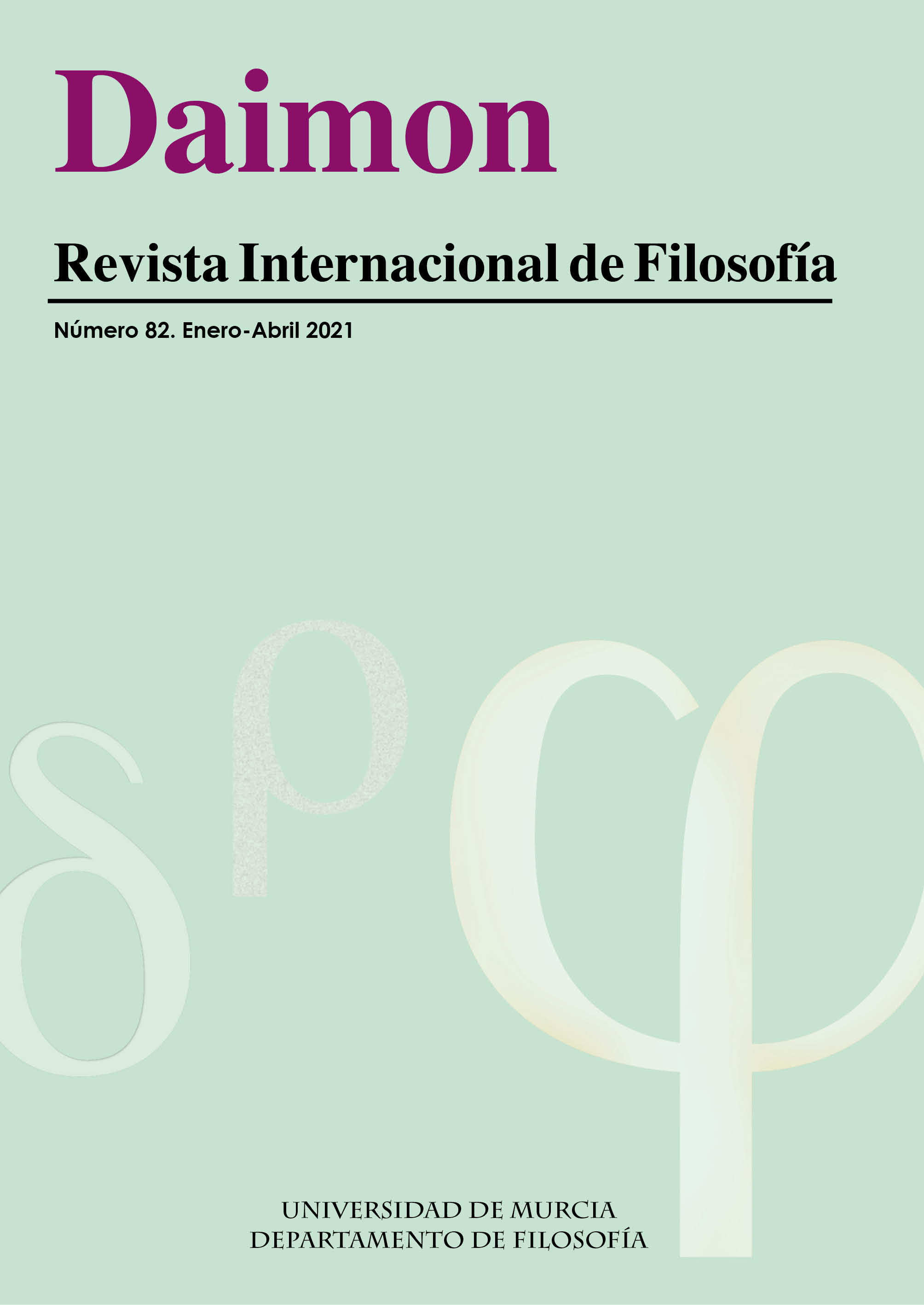The Figure of the Idiot in the Philosophy of Gilles Deleuze considered from some of its sources (Cusa, Descartes, Dostoevsky)
Abstract
In everyday life and common language, idiocy often refers to a lack of intelligence or a defect in thinking. This conception achieved great precision in classical psychiatry and it is not totally absent from contemporary philosophy. However, according to Deleuze and Guattari, the idiot constitutes the philosophical persona par excellence. To what extent does this persona entail or allow constructing an alternative conception of idiocy? Actually, there are three kinds of idiots in Deleuze’s work: one that identifies itself with the fool, another that identifies itself with the madman and a third that laughs at the belief in this world. We will try to offer an answer to the aforementioned question by analyzing each of these three characters.
Downloads
-
Abstract8581
-
PDF (Español (España))4153
References
Asociación Americana de Psiquiatría (2014), Manual diagnóstico y estadístico de los trastornos mentales, 5ª edición, trad. a cargo del CIBERSAM (Centro de Investigación Biomédica en Red de Salud Mental), Asociación Americana de Psiquiatría, Arlington.
Deleuze, Gilles (1967), Présentation de Sacher-Masoch, Les Éditions de Minuit, París.
Deleuze, Gilles (1968), Différence et répétition, Presses Universitaires de France, París.
Deleuze, Gilles (1985), Cinéma 2. L’image-temps, Les Éditions de Minuit, París.
Deleuze, Gilles (2002 [1967]), “L’éclat de rire de Nietzsche”, en L’île déserte, Les Éditions de Minuit, pp. 178-182.
Deleuze, Gilles, y Félix GUATTARI (1980), Mille plateaux. Capitalisme et schizophrénie 2, Les Éditions de Minuit, París.
Deleuze, Gilles, y Félix GUATTARI (1991), Qu’est-ce que la philosophie?, Les Éditions de Minuit, París.
Derrida, Jacques (2008), La bête et le souverain, Galilée, París.
Descartes, René (1953a), La recherche de la vérité par la lumière naturelle, in OEuvres et lettres, Gallimard, Bibliothèque de la Pléiade, París.
Descartes, René (1953b [1641]), Méditations métaphysiques. OEuvres et lettres, in OEuvres et lettres, Gallimard, Bibliothèque de la Pléiade, París.
Dostoïevski, Fiodor (1953 [1869]), L’idiot, trad. de A. Mousset, B. de Schloezer y S. Luneau, Gallimard, Bibliothèque de la Pléiade, París.
Gros-Azorin, Caroline (1998), “Préface”, in Ludwig Binswanger, Le problème de l’espace en psychopathologie, Presses Universitaires du Mirail, Toulouse.
Heidegger, Martin (1977), “Nietzsches Wort ‘Gott ist tot’”, in Gesamtausgabe I. Abteilung: Veröffentlichte Schriften 1914-1970, Band 5: Holzwege, Vittorio Klostermann, Frankfurt am Main, pp. 209-269.
Kraepelin, Emil (1915), Ein Lehrbuch für Studierende und Ärzte, 8ª edición, tomo 4, parte 3, Johann Ambrosius Barth, Leipzig.
Mengue, Philippe (2013), Faire l’idiot, Germina, París.
Nicolás De Cusa (2005), Idiota. De mente, ed. bilingüe, trad. de Jorge M. Machetta, Biblos, Buenos Aires.
Nicolai De Cusa (1983), Idiota. De mente, in Opera Omnia V, ed. L. Baur y R. Steiger, Felix Meiner: Hamburg, pp. 48-160.
Organización Mundial de la Salud (1995), Clasificación Estadística Internacional de Enfermedades y Problemas Relacionados con la Salud, 10ª revisión, trad. a cargo del Centro Venezolano de Clasificación de Enfermedades, Organización Panamericana de la Salud, Washington.
Pinel, Philippe (1801), Traité médico-philosophique sur l’aliénation mentale, Caille et Ravier, París.
Roger, Alain (2007), Bréviaire de la bêtise, Gallimard, París.
Rosset, Cément (2004 [1977]), Le Réel. Traité de l’idiotie. Les Éditions de Minuit, París.
Las obras que se publican en esta revista están sujetas a los siguientes términos:
1. El Servicio de Publicaciones de la Universidad de Murcia (la editorial) conserva los derechos patrimoniales (copyright) de las obras publicadas, y favorece y permite la reutilización de las mismas bajo la licencia de uso indicada en el punto 2.
2. Las obras se publican en la edición electrónica de la revista bajo una licencia Creative Commons Reconocimiento-NoComercial-SinObraDerivada 3.0 España (texto legal). Se pueden copiar, usar, difundir, transmitir y exponer públicamente, siempre que: i) se cite la autoría y la fuente original de su publicación (revista, editorial y URL de la obra); ii) no se usen para fines comerciales; iii) si remezcla, transforma o crea a partir del material, no podrá distribuir el material modificado.
3. Condiciones de auto-archivo. Se permite y se anima a los autores a difundir electrónicamente las versiones pre-print (versión antes de ser evaluada) y/o post-print (versión evaluada y aceptada para su publicación) de sus obras antes de su publicación, ya que favorece su circulación y difusión más temprana y con ello un posible aumento en su citación y alcance entre la comunidad académica. Color RoMEO: verde.











